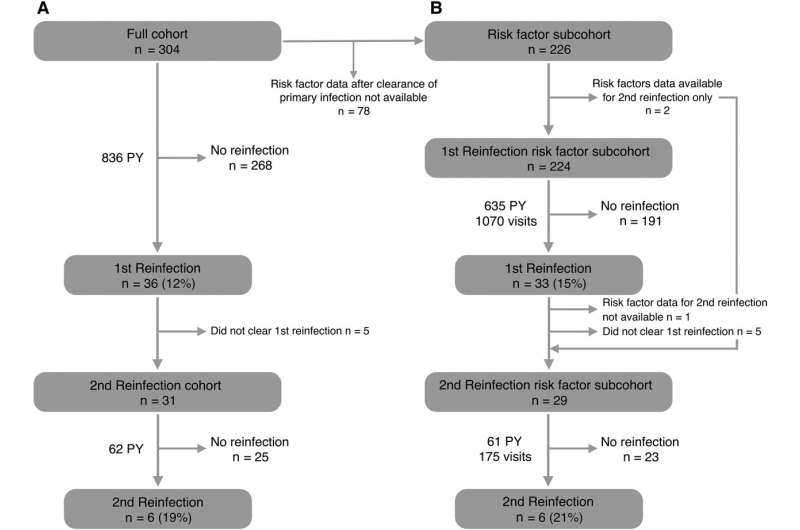This article has been reviewed according to Science X's editorial process and policies. Editors have highlighted the following attributes while ensuring the content's credibility:
fact-checked
peer-reviewed publication
trusted source
proofread
New study determines incidence of and risk factors for hepatitis C virus reinfection among men with HIV

This study provides new perspectives on transmission of hepatitis C virus (HCV), a virus that infects the liver and can be transmitted during injection of drugs, among men who have sex with men (MSM).
The researchers performed a prospective cohort study in New York City of MSM with HIV who had cleared an initial (primary) HCV infection, to determine the incidence of and risk factors for reinfection over a period of almost two decades. The experts assessed for the two risk behaviors for primary HCV from their previous study in the city: receipt of semen in the rectum and sexualized methamphetamine use, along with whether methamphetamine was injected. Multivariable analysis was performed using a Cox proportional hazards model.
They found that the HCV reinfection rate was 10-fold higher than the primary infection rate in New York City, which demonstrated that sexual transmission of the virus is not inefficient or unusual. And the reinfection rate was not lower after the introduction of highly effective, direct-acting antiviral treatment, showing that treatment was not effective in reducing the spread among MSM in the city. Further, they found that the only risk factor for reinfection was receiving semen into the rectum, and sexualized methamphetamine use was not.
Together with the 10-fold higher reinfection rate compared to primary infection rate, these findings suggested that only a small proportion of sexual networks have high HCV prevalence, and that sexualized methamphetamine use—rather than mediating transmission—is instead a surrogate marker for being part of one of these sexual networks with high HCV prevalence.
HCV has long been considered to be parenterally and not sexually transmitted. Further, MSM were not considered to be at risk for HCV infection. When outbreaks of HCV among MSM were first reported about 20 years ago, studies showed low infection rates, so HCV transmission among MSM was thought to be inefficient and unusual.
The routes of infection were also controversial, and while most studies suggested transmission associated with sex, many in the field continued to assume that these infections were due to the traditional risks for infection, drug use and blood exposure. This study showed that HCV reinfections were not unusual among MSM, and that transmission was sexual, specifically through semen, and not related to drug use.
Dr. Fierer of the research said, "This study builds on our prior studies of HCV among MSM in New York City to give the clearest picture so far: most HCV transmission among MSM—at least in the city—is sexual, distinct from the usual route of HCV transmission, which is through blood shared during injection of drugs. As neither condoms nor treatments have been successful strategies for HCV prevention in New York, we need to find novel strategies.
"We wish to thank the hundreds of men who came to us as patients, but who then joined us as participants to collaborate to understand this newly recognized route of transmission of HCV, and we look forward to continuing this collaboration to try to find acceptable ways to stem this ongoing epidemic."
More information: Daniel S Fierer et al, Hepatitis C Virus Reinfection Among Men Who Have Sex With Men With HIV in New York City, Clinical Infectious Diseases (2024). DOI: 10.1093/cid/ciae297


















